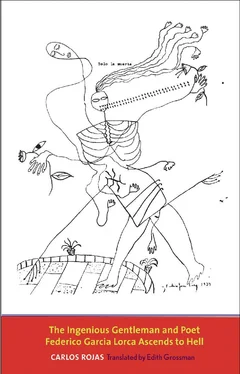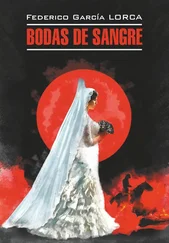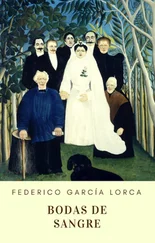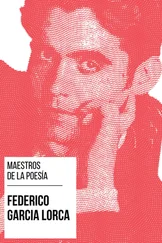PREPARE FOR YOUR TRIAL.
In the house on Calle de Angulo, 1, life glides by as if on tiptoe in the midst of the crimes of war. Partially hidden behind the latticed window of my bedroom, I see the Rosales father leave punctually every morning and afternoon for his stores called La Esperanza. Downstairs, on the floor with the courtyard with the fountain and white columns, he leaves behind the mother, their daughter Esperancita, an ancient cook who looks as old as the world, and a twisted little maid who stutters. Upstairs, on the second floor, which is almost a separate dwelling, Aunt Luisa says goodbye to me to go to early Mass. “God be with you, child, and don’t do anything foolish. I’ll pray for you.” “Pray for everyone, Doña Luisa, the living and the dead, the victims and especially their killers, who will find it so difficult to enter heaven.” At midmorning, Esperancita brings me a coffee with two cubes of sugar and a copy of El Ideal. Every day, as reprisals for the bombings, it announces executions by summary judgment and doesn’t conceal the shootings with no trial at all. In moments of distress, and always insisting on getting me over to the other side, Luis has confessed to me that they also kill hundreds by the cemetery walls and ravines in Víznar. My brother-in-law Manolo is one of the prisoners, if he’s still alive after having been the socialist mayor of Granada for ten whole days. My poor sister, with her young children, must be suffering unimaginable torment, though it’s shared by thousands of women in Granada. In spite of this vast tragedy, which perhaps lies in wait for me, coming closer each night, it imperceptibly moves away from my spirit, as if it were someone else’s dream. Esperancita has a Falangista fiancé in Madrid, and at this point she doesn’t know whether he’s alive or dead. She tells me about her love, her anguish, even her nightmares of a girl in love, as if I were her older sister or we both loved the same man. I do what I can to calm her: “Don’t worry, dear, everything will work out. Before you know it this absurd war will end and you’ll go arm and arm with your fiancé to the opening of my next play.” She smiles through her tears and asks what I’m writing now. “The destruction of Sodom and Gomorrah by the wrath of God Almighty and the invention of incest by Lot and his daughters.” “Jesus, how awful! It must be more barbaric than Yerma. When will we see a play of yours with people who love each other, marry, and have children as beautiful as angels?” she asks, still smiling, while she dries her eyes with an embroidered handkerchief. “Never, Esperancita, because people have forgotten how to love, marry, and conceive children like angels. They give birth only to monsters and buffoons in their image and likeness.” “You may be right,” she agrees, very serious now. Then she picks up the coffee service, says goodbye, kissing me on the cheek, and leaves quickly. We see each other again in the afternoon, when they bomb Granada. Doña Esperanza Rosales calls up to her sister and me to take refuge on the ground floor. We all squeeze together into a tiny room filled with carved credenzas and embroidered scenes. The women pray or sob to the boom of explosions and the interminable howl of sirens. I’m frightened by my serenity when I recall my earlier cowardice. Two days later El Ideal says another fifteen prisoners chosen at random have been executed in very just revenge for the attack. Another page in the same issue carries the note of protest from several prisoners over the most recent bombardment, which even damaged the Alhambra. It is addressed to His Excellency the Military Commander of the Garrison (“We sincerely hope that all Spaniards will echo our sentiments and cease spilling so much innocent blood, for the good of Spain. Long live Your Excellency!”), and one of the signers is my brother-in-law Manolo. In this way I learn he is still alive.
PREPARE FOR YOUR TRIAL.
At my request, Esperancita has brought up À la recherche du temps perdu , in the translation by Quiroga Plá and Pedro Salinas. If I remember correctly, which in this case would be an unavoidable irony, Proust publishes the first volume of his vast novel, Du côté de chez Swann , on the eve of the Great War. Perhaps there’s no other in the entire saga in which the visual evocation of what he has experienced, from the bell towers and shop windows of Combray to the flowering hawthorn and ruined medieval spires in the domain of the Guermantes, is so transparent. Perhaps the invocation of the past, by the grace of Proust in this part of the Recherche , has no rival in the history of any literature. I even wondered sometimes, after I was dead, whether Proust had managed to see in life and from his asthmatic’s bed the anticipated staging of his memories in his theater in hell, only to translate that afterward into precise words. Up to that point, the work is also the retable of a paradise lost and recovered by memory. Then, with the passage of time and in the transition from Combray to Paris, Marcel moves from Eden to Sodom and Gomorrah. From the idyllic little room in his parents’ country house, where the child narrator reads, dreams, and inadvertently perceives his memories, we come by way of jealousy and the perversion of all love to Jupien’s brothels for queers. The world of the novel and its context in the history of those times matured, were corrupted, and became ready for the wrath of God.
PREPARE FOR YOUR TRIAL.
The reasoning for my defense and my examination of conscience return me to my own Sodom and Gomorrah (“ … When will we see a play of yours with people who fall in love, marry, and have children as beautiful as angels?”). This persecution and enclosure were necessary in order for me to think about Proust and guess the real significance of the play I proposed to write. It all fits together now like the implacable cogs of a watch that shows the hours not of time but of destiny. I supposed I conceived this work of mine, which I already foresee will be unfinished forever, as a Voltairean reply to Don Manuel de Falla for his anger at the appearance of my “Ode to the Blessed Sacrament of the Altar.” Yet, and it’s always worth repeating, I’d swear with identical certainty that my poem was written by a believer, and that in spite of himself Falla would have taken me in and hidden me in his house. I also think it’s undeniable that my purpose in writing Sodom and Gomorrah was very different from and of course much more complex than that small vengeance. As I once said to Gerardo Diego, and I think he cited it in that poetic anthology of his that so resembled a hodgepodge, every creative act is a man or a woman going astray in a dark wood, which perhaps ought to coincide on never-drawn maps with the dark night of the soul, where poets lose their way because they don’t know themselves. In fact, and even setting aside my pederast’s remorse and pride, Sodom and Gomorrah , or I should say, the idea of Sodom and Gomorrah , was nothing but the allegory before-the-fact of this Civil War, in which the wrath of heaven is the rage that leads us to persecute and torment one another. After this catastrophe, perhaps we won’t even conceive of incest. But the world of our youth, the one where Ignacio Sánchez Mejías, Rafael Alberti, José Antonio Primo de Rivera, Luis Rosales, and I reached the age of reason and attained our manhood in the same grouping that shrank or expanded in very few years, will have disappeared forever. Nothing will remain but shattered vestiges scattered by the winds of time, like the pilasters, caryatids, and broken statues of a dead Middle Ages, which Proust found in the meadows along Guermantes way. Perhaps one of these broken ruins is my own work. In another time I might have wanted to believe this was so. Now, the possibility of my writing surviving or not leaves me indifferent. In any case, my Sodom and Gomorrah , unfinished forever and never really started beyond some sketches, would have been not only the foretelling of this slaughter but also the last will and testament of our generation.
Читать дальше












